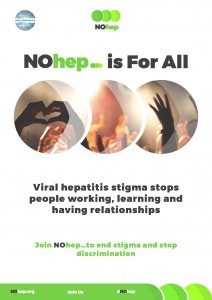
By Christine Kukka
It’s Sexual Health Awareness month and a great time to test your knowledge about how hepatitis B is — and isn’t — spread sexually.
We know hepatitis B is easily transmitted through sex. It’s a resilient virus, can live for up to a week on a dry surface and it’s 50- to 100-times more infectious than HIV. In fact, sexual contact is the most common way hepatitis B is spread in the United States. So let’s see how much you know:
I’m in my 20s and can safely assume everyone has been vaccinated against hepatitis B, so I don’t have to disclose my infection. True or False?
False. New hepatitis B cases have indeed been steadily declining since the vaccine was introduced in the 1980s, but not everyone has been vaccinated. Here’s proof. As a result of the heroin epidemic sweeping through rural America, new hepatitis B infections have risen for the first time in decades among 20- and 30-year-olds who were not lucky enough to be immunized during childhood.
Oral sex doesn’t transmit hepatitis B. True or False?
It’s complicated. There are no confirmed reports of hepatitis B infection resulting from oral sex, but there’s still a risk for infection. If you have a high viral load (HBV DNA), you may still be putting partners at risk of infection if they have bleeding gums, mouth sores, or anything that increases the likelihood of infectious fluids entering their bodies. Bottom line, oral sex has a lower risk of spreading hepatitis B than other sexual practices, but some risk remains. And don’t forget, other sexually-transmitted infections such as chlamydia, gonorrhea and syphilis are spread through oral sex. Using a condom or dental dam reduces infection risk.

An uninfected woman is at higher risk of catching hepatitis B from an infected male partner, than an uninfected man who has sex with an infected woman. True or False?
True. It’s not gender but sexual activity that usually defines the infection risk, but in this case an uninfected woman is at very high risk of infection if she has unprotected sex and is on the receiving end of hepatitis B-infected semen.
I’m positive for the hepatitis B surface antigen (HBsAg), but my viral load is undetectable. I don’t have to worry about disclosing or spreading hepatitis B. True or False?
False. As long as you test positive for the surface antigen, you still have the hepatitis B virus in your blood and body fluids. Yes, the risk is lower because you’re HBV DNA-undetectable, but you still need to practice safe sex and disclose your hepatitis B to your prospective sexual partners.
Anal sex is more effective at transmitting hepatitis B than vaginal sex. True or False?
True. Any sexual activity that might cause abrasions, cuts, or other trauma is especially risky. To minimize risk, experts recommend use of a condom.
Kissing can transmit hepatitis B. True or False?
False. Spreading hepatitis B through kissing is highly unlikely, however, deep kissing that involves the exchange of large amounts of saliva might result in infection if there are cuts or abrasions in the mouth of the infected person, especially if they have a high viral load.
Blood has more hepatitis B virus in it than semen or vaginal fluids. True or False?
True. Blood has the highest volume of virus. Semen and vaginal fluids have intermediate levels, and urine and feces have the lowest level.







 By Christine Kukka
By Christine Kukka For example, between
For example, between  The annual Hep B United Summit, organized by the
The annual Hep B United Summit, organized by the 



